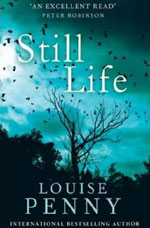Marilynne Robinson: Housekeeping
This novel begins with a train wreck
and continues with transience, decay, and death.
I cannot think of a better way to
describe what Robinson does with language than this phrase from The New
Yorker's review, as quoted on the book's flyleaf: "the tense
precision of good poetry."
And yet I wonder - if I had read this
novel before reading anything else by Marilynne Robinson, would its
depressing themes have discouraged me from trying Gilead and the rest
of her books, no matter how much I love what she does with language?
This is the first book in a mystery
series set in Quebec and featuring Chief Inspector Armand Gamache, a
very sympathetic crime investigator, and lots of other vivid
characters I'd like to get to know better. Too bad that one of the
most interesting characters is the one whose death Gamache is
investigating here, so I'm pretty sure she won't make an appearance
in the later parts of the series.
On the whole, this is a pretty enjoyable
traditional detective novel. Not exactly "a cosy mystery" despite the people and setting, but not too gory or gloomy either. If you are wondering whether this series might be your cup of tea, go to Louise Penny's author website and read the excerpt - it's a good sample.
Micha Boyett: Found. A Story of
Questions, Grace & Everyday Prayer
A mother of a toddler feels she has
lost the prayer life and the relationship with God she used to have.
She looks for help and inspiration in the writings of St Benedict and
the practices of Benedictine monks.
Reading this was a bit like going on a
journey with Micha as she discovers grace, even and especially when
she doesn't find simple clear-cut answers to her questions. I
identify a lot with her tendency to try to earn the love and approval
of God. And yet, that's not at all what life is about, and I think
I'll go back to this book some day to remind myself of that.
Gary Wilkerson: David Wilkerson. The Cross, the Switchblade and the Man Who Believed.
A son writes his famous father's biography, and does it well. The book gives a complex portrait of David Wilkerson: both the victories and the struggles, weaknesses and strengths. Family, friends, and coworkers give their views. And what a story it all makes. This is no hagiography, but it's a testimony of what God has done.
 William Zinsser: On Writing Well. The
Classic Guide to Writing Nonfiction (30th anniversary
edition)
William Zinsser: On Writing Well. The
Classic Guide to Writing Nonfiction (30th anniversary
edition)
Apparently Zinsser knows what he is
doing as a writer, because I really enjoy reading this writing guide.
Essential reading for people who want to write nonfiction.

I've been meaning to read On Writing for a long time!
ReplyDeleteGilead is the only novel by Robinson that I've read. It was a tear-jerker. It was full of wisdom, but I definitely cried while I listened to the audiobook and tried to clean the floors. I want to read more of her work, but I think depressing themes might be her specialty!
Thanks for your comment! Gilead made me cry, too. Yet, as far as I can recollect, Gilead certainly had its share of sad themes, but it also had a great deal more hope than Housekeeping. But this is not to discourage you from reading it - for all I know, you may be able to get something more out of Housekeeping than I did :)
DeleteHi Tuija - I tried to comment here the other day and got interrupted somehow (I think my Wi-Fi dropped) so I'll try again. This is a great mix of books! Yes, Housekeeping is something of a downer. I thought the characters were so interesting but I didn't "get" the book fully.
ReplyDeleteI'm glad to know I'm not alone in feeling that Housekeeping is a little depressing. :)
DeleteAnd thanks, again, for recommending Micha Boyett!